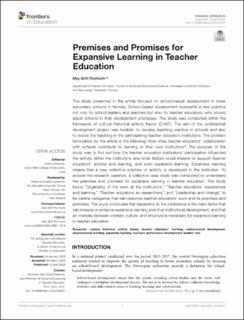| dc.contributor.author | Postholm, May Britt | |
| dc.date.accessioned | 2022-05-11T07:41:29Z | |
| dc.date.available | 2022-05-11T07:41:29Z | |
| dc.date.created | 2020-04-29T11:28:55Z | |
| dc.date.issued | 2020 | |
| dc.identifier.citation | Frontiers in Education. 2020, 5 . | en_US |
| dc.identifier.issn | 2504-284X | |
| dc.identifier.uri | https://hdl.handle.net/11250/2995174 | |
| dc.description.abstract | The study presented in the article focused on school-based development in lower secondary schools in Norway. School-based development represents a new practice not only for school leaders and teachers but also for teacher educators, who should assist schools in their development processes. The study was conducted within the framework of cultural historical activity theory (CHAT). The aim of the professional development project was twofold: to develop teaching practice in schools and also to evolve the teaching in the participating teacher education institutions. The problem formulation for the article is the following: How does teacher educators’ collaboration with schools contribute to learning in their own institutions? The purpose of the study was to find out how the teacher education institutions’ participation influenced the activity within the institutions and what factors could impede or support teacher educators’ actions and learning, and even expansive learning. Expansive learning means that a new collective practice or activity is developed in the institution. To answer the research question, a collective case study was conducted to understand the premises and promises for expansive learning in teacher education. The study found “Organizing of the work at the institutions,” “Teacher educators’ experiences and learning,” “Teacher educators as researchers,” and “Leadership and change” to be central categories that can describe teacher educators’ work and its premises and promises. The study concludes that leadership at the institutions is the main factor that can impede or enhance expansive learning and thus institutional development, and that an interplay between content, culture, and structure is necessary for expansive learning in teacher education. | en_US |
| dc.language.iso | eng | en_US |
| dc.publisher | Frontiers | en_US |
| dc.rights | Navngivelse 4.0 Internasjonal | * |
| dc.rights.uri | http://creativecommons.org/licenses/by/4.0/deed.no | * |
| dc.title | Premises and Promises for Expansive Learning in Teacher Education | en_US |
| dc.title.alternative | Premises and Promises for Expansive Learning in Teacher Education | en_US |
| dc.type | Peer reviewed | en_US |
| dc.type | Journal article | en_US |
| dc.description.version | publishedVersion | en_US |
| dc.source.pagenumber | 11 | en_US |
| dc.source.volume | 5 | en_US |
| dc.source.journal | Frontiers in Education | en_US |
| dc.identifier.doi | 10.3389/feduc.2020.00041 | |
| dc.identifier.cristin | 1808596 | |
| cristin.ispublished | true | |
| cristin.fulltext | original | |
| cristin.qualitycode | 1 | |

